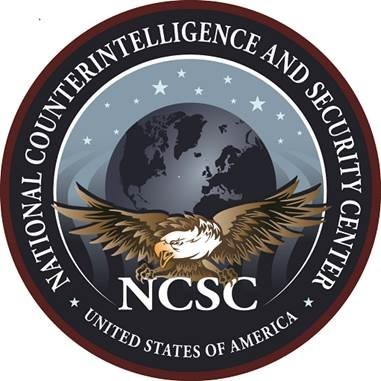National Counterintelligence and Security Center
Cyber Security
The cyber threat is simultaneously a national & homeland security threat and a counterintelligence problem. State and non-state actors use digital technologies to achieve economic and military advantage, foment instability, increase control over content in cyberspace and achieve other strategic goals — often faster than our ability to understand the security implications and neutralize the threat.
NCSC works with the U.S. Government cyber community and the IC, to provide the CI and security perspective on foreign intelligence and other threat actors’ cyber capabilities and provides context and possible attribution of adversarial cyber activities.
Relevant Reports, Briefings & Reading Material:
Provides an indispensable series of basic steps every American can take to safeguard their home networks from cyber intrusions
CI tips for cyber smarts:
- Spear Phishing and Common Cyber Attacks (PDF)
- Mobile Device Safety (PDF)
- Social Media Safety (PDF)
- Reducing Your Digital Footprint (PDF)
Other Links:
How We Work
“CI and security are interconnected and cannot be
executed in isolation.” – NCSC Director Evanina
The solutions to countering adversarial threats often lie at the intersection of the CI and security disciplines. CI has both a defensive mission — to protect our nation’s secrets and assets from theft, manipulation, or destruction by foreign adversaries by knowing their intentions, targets, capabilities and methods — and an offensive mission — to exploit, deceive or disrupt their hostile activities. Assuring the security of personnel, data, networks, national & trade secrets, and physical facilities – is a critical element. The U.S. faces higher cyber, physical, and technical threat levels than ever before; and security policies, standards, guidelines and practices must be based on sound threat analysis and risk management.
NCSC blends CI and security expertise to lead and support CI and security activities across the U.S. Government, the Intelligence Community and U.S. private sector entities at risk of intelligence collection, penetration or attack by foreign and other adversaries.
![]()
- For Counterintelligence, the Director of NCSC serves as both the National Counterintelligence Executive (NCIX) and the National Intelligence Manager for Counterintelligence (NIM-CI).
- For Security, NCSC is responsible for Security Executive Agent (SecEA) activities, on behalf of the Director National Intelligence, across the Executive Branch and is the DNI’s designee for oversight and direction for safeguarding national security programs across the IC.
We also:
- Co-lead, with the FBI, the National Insider Threat Task Force (NITTF).
- Provide CI & Security public awareness and education through the Know the Risk | Raise Your Shield national campaign and practitioner training for the public and private sectors.
- Work closely with Mission Partners and an array of Stakeholders to address the enduring and emerging foreign and other adversarial threats to accomplish our five Strategic Goals.
Who We Are

National Counterintelligence and Security Center
The National Counterintelligence and Security Center (NCSC) is led and staffed by a cadre of professionals with decades of national security and law enforcement expertise and varied analytic, investigative and policymaking backgrounds. Working with partners across the Executive Branch Departments and Agencies and the private sector, NCSC provides expertise in several mission areas including insider threat, supply chain risk management, and personnel security. Additional information is available in the NCSC Strategic Plan for 2016-2020.
Security Executive Agent
NCSC professionals also serve as the Executive Staff for the Director of National Intelligence as Security Executive Agent (SecEA). Presidential Executive Order EO 13467, assigned the DNI responsibility for effective and uniform policies and procedures governing access to classified information for the Intelligence Community (IC) and government-wide.
National Insider Threat Task Force
Since 2011, NCSC has been the home of the National Insider Threat Task Force (NITTF). Under joint leadership of the Attorney General and the Director of National Intelligence, NITTF works government wide to deter the compromise of classified information by malicious insiders and to establish programs to protect federal classified networks.
What We Do
 The National Counterintelligence and Security Center provides effective leadership and support to the counterintelligence and security activities of the U.S. Intelligence Community, the U.S. Government, and U.S. private sector entities who are at risk of intelligence collection or attack by foreign adversaries.
The National Counterintelligence and Security Center provides effective leadership and support to the counterintelligence and security activities of the U.S. Intelligence Community, the U.S. Government, and U.S. private sector entities who are at risk of intelligence collection or attack by foreign adversaries.
About the National Counterintelligence and Security Center (NCSC)
The National Counterintelligence and Security Center (NCSC) is part of the Office of the Director of National Intelligence and is staffed by senior counterintelligence (CI) and other specialists from across the national intelligence and security communities. The NCSC develops, coordinates, and produces:
- National Threat Identification and Prioritization Assessment (NTIPA) and other analytic CI products.
- The National Counterintelligence Strategy of the United States of America.
- Priorities for CI collection, investigations, and operations.
- CI program budgets and evaluations that reflect strategic priorities.
- In-depth espionage damage assessments.
- CI awareness, outreach, and training standards policies depends on the 17 agencies in the Intelligence Community and partners across the U.S. Government and with experts in the private sector.




